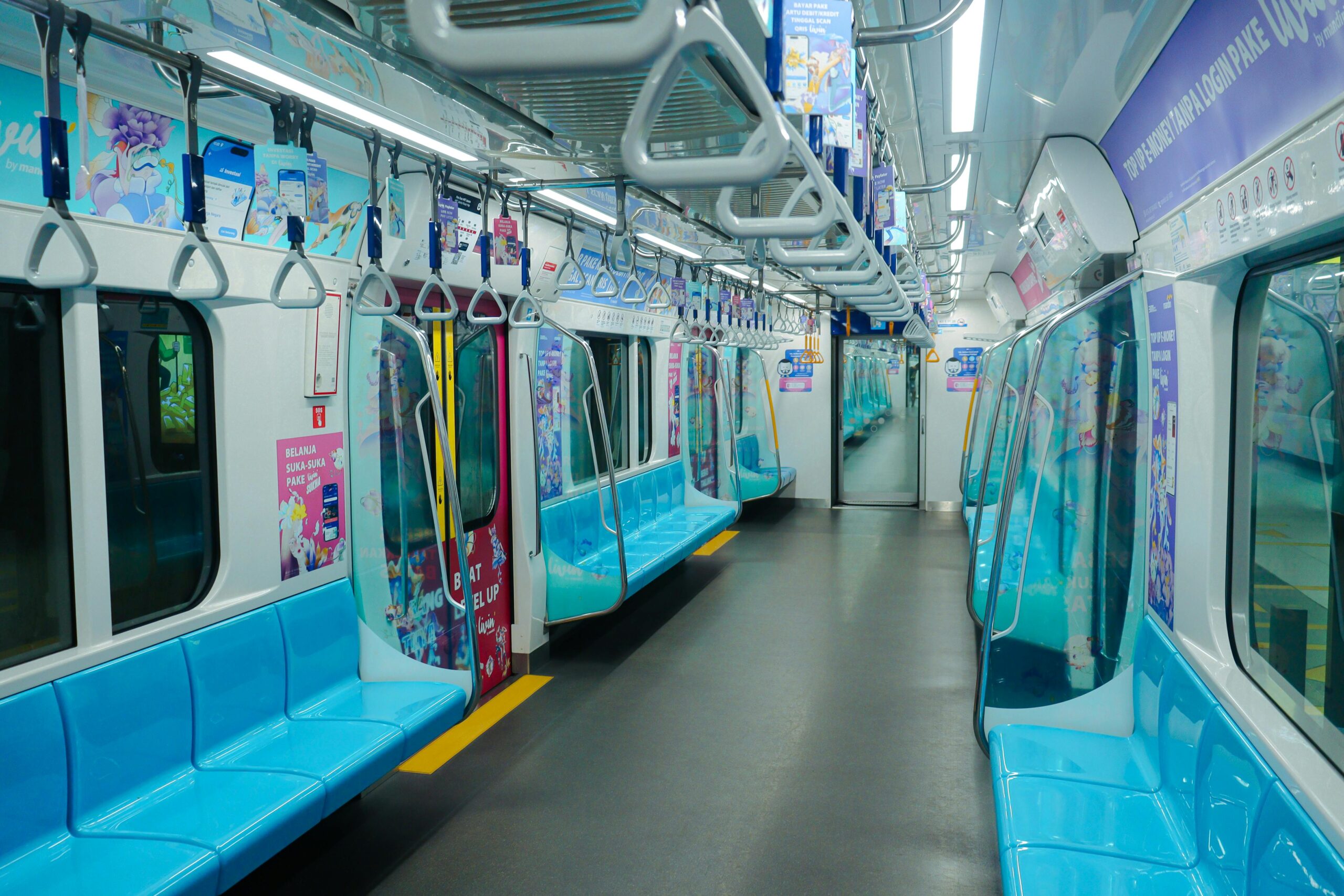🚇 新制上路,你知道「博愛座」現在怎麼說嗎?
帶你學會:
✅ 博愛座、優先席怎麼用英文說才自然
✅ 6 個搭大眾運輸常見英文單字一次學起來
✅ 在捷運上要讓座怎麼開口才禮貌又道地
✅ 「I thought it was…」這句話超萬用!
Emma and Leo are riding the MRT.
Emma 和 Leo 正在搭捷運。
Dialogue 對話
(Emma = E;Leo = L)
E: Hey Leo, look! That sign says “Priority Seat.” "優先席"
L: Really? I thought it was called “Courtesy Seat”"博愛座" before.
E: Yeah, they just changed it.
L: Why did they do that?
E: Now, the seat is for anyone who really needs it, not just the elderly.
L: Oh, like people with injuries or pregnant women?
E: Exactly. Or someone feeling sick.
L: That’s fair. It helps everyone.
E: Right! And the government wants all buses and trains to use the same sign.
L: I like it. People will understand it better.
🔑 重點單字 Vocabulary
priority [praɪˈɔːrəti] n. 優先
Safety is our top priority.
安全是我們最優先的事。
seat [siːt] n. 座位
This is your seat.
這是你的座位。
change [tʃeɪndʒ] v. 更改;變化
They changed the rule last week.
他們上週改了這個規定。
injury [ˈɪndʒəri] n. 受傷
She has a leg injury.
她腳受傷了。
pregnant [ˈpreɡnənt] adj. 懷孕的
The pregnant lady needs a seat.
那位孕婦需要一個座位。
sign [saɪn] n. 標示
That sign is easy to understand.
那個標示很容易懂。
💬 學習焦點 Useful Phrases
Look!你看!
Look! That bus is full.
你看!那台公車滿了。
I thought it was…我以為是…
I thought it was closed.
我以為它關了。
not just…不只是…
Not just kids, but also adults.
不只是小孩,也包括大人。
M: Welcome to MJ ENGLISH! Today we're talking about something you've probably noticed on the MRT - a small but important change.
M:歡迎收聽 MJ ENGLISH!今天我們要聊一個你最近在捷運上可能已經注意到的小變化,但這個變化其實意義很大喔。
J: That's right! Have you seen those new signs on the trains? They used to say "Courtesy Seat," but now they say something different.
J:沒錯!你有沒有發現車廂裡的那些新標示?以前上面寫的是「博愛座」,但現在改成別的詞了。
M: Exactly! They now say "Priority Seat." And this isn't just a simple word change - there's actually a deeper meaning behind it.
M:對~現在標示的是「優先席」。這不只是換個詞這麼簡單,背後其實有更深的含義喔!
J: Before we dive in, let's listen to a conversation between Emma and Leo. They're riding the MRT and discussing this very topic.
J:在我們深入聊之前,先來聽一段 Emma 和 Leo 在捷運上討論這個話題的對話吧。
M: Pay attention to how they talk about the change and why it matters.
M:注意聽聽他們怎麼談論這個變化,以及為什麼這件事很重要。
Take a Seat: A New Rule
🪑 新規上路!請坐「優先席」
Emma and Leo are riding the MRT.
Emma 和 Leo 正在搭捷運。
Dialogue 對話
(Emma = E;Leo = L)
E: Hey Leo, look! That sign says “Priority Seat.” "優先席"
E:嘿 Leo,你看!那個標示寫著「Priority Seat」,就是「優先席」。
L: Really? I thought it was called “Courtesy Seat”"博愛座" before.
L:真的嗎?我記得以前不是叫「Courtesy Seat」——「博愛座」嗎?
E: Yeah, they just changed it.
E:對啊,他們最近才改的。
L: Why did they do that?
L:他們為什麼要改啊?
E: Now, the seat is for anyone who really needs it, not just the elderly.
E:現在這個座位是給「任何真正有需要的人」,不只是老人而已。
L: Oh, like people with injuries or pregnant women?
L:喔~像是受傷的人或是孕婦嗎?
E: Exactly. Or someone feeling sick.
E:沒錯!或者是身體不舒服的人也可以坐。
L: That’s fair. It helps everyone.
L:這樣滿合理的耶,對大家都有幫助。
E: Right! And the government wants all buses and trains to use the same sign.
E:對啊,而且政府希望所有公車和捷運都統一用這個標示。
L: I like it. People will understand it better.
L:我覺得這樣很好,大家會更清楚明白這個座位的用途。
M: Great dialogue! So, what did you notice about Emma and Leo's conversation?
M:這段對話不錯吧~那你從他們的對話裡發現了什麼呢?
J: Well, first, Emma points out the new sign. She uses a very common phrase - "Look!" This is a great way to get someone's attention in English.
J:首先,Emma 指出了新的標示,她用了一句很常見的英文:「Look!(你看!)」這是英文裡吸引別人注意力的超實用句子。
M: Absolutely! "Look!" is so simple but so useful. You can use it when you want someone to see something interesting or important. For example, "Look! That bus is full."
M:沒錯!"Look!" 雖然簡單,但真的超好用。當你想叫別人看某件事情,不管是有趣的還是重要的,都可以用這句。比如:「你看!那台公車已經滿了!」
J: And Leo responds with "Really?" - showing surprise. Then he says "I thought it was called…" This is a perfect way to express what you believed before.
J:然後 Leo 回「真的嗎?」表示驚訝,接著他說「我以前以為叫…」,這是表達「我原本以為」的超自然說法。
M: That's such a natural expression. "I thought it was…" You can use this when you had a different understanding about something. Like, "I thought it was closed."
M:「I thought it was…」這句真的很口語。當你發現原來跟自己想的不一樣時,就可以這樣說。像是:「我以為那間店關了耶~」
J: Now, let's talk about why this change is significant. The word "priority" has a stronger meaning than "courtesy."
J:接下來我們來講為什麼這個用字的變化很重要。"Priority" 這個字比 "Courtesy" 更有力量、更直接。
M: Exactly! "Courtesy" suggests politeness - like it's nice to give up your seat, but not required. "Priority" suggests these seats are specifically for certain people first.
M:沒錯!"Courtesy" 給人的感覺是「出自禮貌」,好像讓座是加分,但不是義務。但 "Priority" 表示「這些座位是優先給有需要的人坐的」,意義更明確。
J: And Emma mentions something important - these seats are for "anyone who really needs it, not just the elderly." This is a key phrase: "not just…"
J:Emma 還提到一個重點:「這些座位是給真正有需要的人,不只是長輩。」這句裡的 "not just…" 是很實用的句型喔!
M: Right! "Not just" means "not only" or "not limited to." It's expanding the idea. So it's not just elderly people, but also pregnant women, people with injuries, or anyone feeling sick.
M:對~"not just" 就是「不只是」或「不僅限於」的意思。意思是:除了老人,還包括孕婦、受傷的人,甚至是身體不舒服的乘客。
J: Let's break down some vocabulary from this conversation. First, "priority" - P-R-I-O-R-I-T-Y. It means something that's most important or comes first.
J:我們來看看這段對話中的幾個重要單字。第一個是 "priority",意思是「優先」或「最重要的事」。
M: We can say "Safety is our top priority" - meaning safety is the most important thing.
M:比如你可以說「安全是我們最優先考量的事情」,代表安全最重要。
J: Next, "seat" - S-E-A-T. This is simple - it's where you sit. "This is your seat."
J:再來是 "seat",意思就是「座位」,像是「這是你的座位」。
M: Then we have "change" - C-H-A-N-G-E. As a verb, it means to make something different. "They changed the rule last week."
M:"change" 是「改變」,當動詞用時表示讓某件事變得不同。比如:「他們上週改了規則。」
J: "Injury" - I-N-J-U-R-Y. This means being hurt or damaged. "She has a leg injury."
J:"injury" 是「受傷」,像「她腳受傷了」可以說 "She has a leg injury."
M: "Pregnant" - P-R-E-G-N-A-N-T. This describes a woman expecting a baby. "The pregnant lady needs a seat."
M:"pregnant" 是「懷孕的」,例如:「這位孕婦需要座位。」
J: And finally, "sign" - S-I-G-N. This is a notice or symbol that gives information. "That sign is easy to understand."
J:最後是 "sign",指的是指示牌或告示,像「那個標示很容易理解。」
M: Now, let's practice some useful phrases from today's dialogue. The first one is "Look!" - it's perfect for getting attention.
M:來練習幾個今天出現的實用句型。第一個是 "Look!" —— 用來吸引別人注意超好用!
J: Try using it: "Look! There's a seat available!" or "Look! The train is coming!"
J:試著用看看:「你看,有座位了!」或是「快看,電車來了!」
M: The second phrase is "I thought it was…" This shows what you believed before learning something new.
M:第二句是 "I thought it was…",用來表達「我原本以為……」,但後來發現不是這樣。
J: You can say "I thought it was expensive" or "I thought it was difficult." It's very natural.
J:像是「我以為這東西很貴」或「我以為這件事很難」,都可以這樣說,很口語化。
M: And don't forget "not just…" This phrase helps you expand an idea or include more examples.
M:還有 "not just…",這個句型可以讓你表達「不只這樣」或「還包括其他情況」。
J: "Not just students, but also teachers" or "Not just coffee, but also tea."
J:像是「不只是學生,連老師也…」或是「不只有咖啡,還有茶。」
M: So, what's the main takeaway from today's lesson?
M:那今天這一集的重點是什麼呢?
J: Well, language changes, just like these signs! The new "Priority Seat" terminology is clearer and more inclusive.
J:語言會變,就像這些標示一樣!用「優先席」取代「博愛座」的說法,其實更清楚也更包容。
M: And we learned some very useful everyday phrases that you can use in many situations.
M:而且我們也學到一些日常英文對話裡超常用的句型,隨時都能派上用場。
J: Remember, small changes in language can make a big difference in meaning and understanding.
J:記得,語言裡的小改變,往往會讓整體意思和理解度差很多喔!
M: Before we finish, let's quickly review. Can you remember what "priority" means?
M:在結束之前,來快速複習一下~你還記得 "priority" 是什麼意思嗎?
J: It means something that's most important or comes first.
J:意思是「最重要的事」或「優先的東西」。
M: And what's the difference between "courtesy" and "priority"?
M:那 "courtesy" 和 "priority" 的差別是什麼呢?
J: "Courtesy" suggests politeness, while "priority" suggests something that should come first or is most important.
J:"courtesy" 比較偏向「禮貌」上的讓座,但 "priority" 表示「應該要先給有需要的人」,語氣比較強烈也比較明確。
M: Perfect! That's all for today's episode of MJ ENGLISH.
M:太棒了!今天的 MJ ENGLISH 就到這邊~
J: Keep practicing these phrases, and you'll sound more natural in English conversations.
J:多多練習這些句子,你的英文會越講越自然!
M: Thanks for listening, and we'll see you next time!
M:謝謝收聽,我們下次見~
J: Bye for now!
J:大家掰掰囉~!


